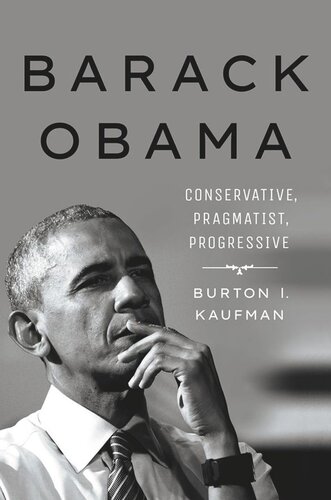

Most ebook files are in PDF format, so you can easily read them using various software such as Foxit Reader or directly on the Google Chrome browser.
Some ebook files are released by publishers in other formats such as .awz, .mobi, .epub, .fb2, etc. You may need to install specific software to read these formats on mobile/PC, such as Calibre.
Please read the tutorial at this link: https://ebookbell.com/faq
We offer FREE conversion to the popular formats you request; however, this may take some time. Therefore, right after payment, please email us, and we will try to provide the service as quickly as possible.
For some exceptional file formats or broken links (if any), please refrain from opening any disputes. Instead, email us first, and we will try to assist within a maximum of 6 hours.
EbookBell Team

4.8
84 reviewsIn this insightful biography, Burton I. Kaufman explores how the political career of Barack Obama was marked by conservative tendencies that constantly frustrated his progressive supporters and gave the lie to socialist fear-mongering on the right. Obama's was a landmark presidency that paradoxically, Kaufman shows, resulted in few, if any, radical shifts in policy.
Following his election, President Obama's supporters and detractors anticipated radical reform. He was the first African American to serve as president and reached the White House on a campaign promise of change. But Kaufman finds in Obama clear patterns of classical conservativism of an ideological sort and basic policy-making pragmatism. His commitment to usher in a multi-racial, multi-ethnic, and multi-cultural society was fundamentally connected to opening up, but not radically altering, the existing free enterprise system.
The Affordable Care Act, arguably President Obama's greatest policy achievement, was a distillation of his complex motivations for policy. More conservative than radical, the ACA fitted the expansion of health insurance into the existing system. Similarly, in foreign policy, Obama eschewed the use of force to affect regime change. Yet he kept boots on the ground in the Middle East and supported ballot-box revolts geared toward achieving in foreign countries the same principles of liberalism, free enterprise, and competition as existed in the United States.
In estimating the course and impact of Obama's full political life, Kaufman makes clear that the desire for and fear of change in the American polity affected the popular perception but not the course of action of the 44th US President.